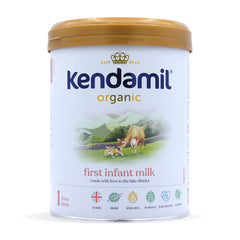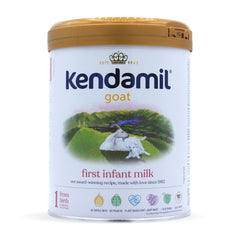The Role of Iron in Infant Formula: Too Much or Not Enough?
Iron in Infant Formula: Essential Nutrient or Cause for Concern?
When new parents stand in front of shelves of baby food, one question inevitably arises: Does all baby formula have iron? This micronutrient has become a real sticking point in pediatrics. On the one hand, iron is essential for brain development and for preventing anemia in infants. On the other hand, some studies link excess iron in baby formula to digestive problems, changes in gut flora, and even an increased risk of infections.
The paradox is that most formulas contain 10-12 times more iron than breast milk. It raises a logical question: Is this amount really necessary, or are we inadvertently creating new problems while trying to solve old ones? Let's explore this dilemma.
Why Iron Matters in Baby Formula: What Every Parent Should Know
Today, questions about iron content in infant formulas are increasingly common among concerned parents. Parents should understand "what is an iron-fortified formula?" and recognize its important health benefits. Iron serves as a key element for healthy brain development and overall infant growth. During early development, iron is crucial for red blood cell formation and oxygen transport. Adequate iron intake helps infants develop properly and maintain optimal health throughout their growth.
Iron in infant formula helps provide essential minerals that babies need for healthy development. Around three months of age, infants' natural iron stores begin to deplete significantly. Iron-fortified formula helps replenish these iron stores and maintain optimal health for growing babies. For infants who aren't breastfed, high-quality iron-fortified formula represents the best nutritional choice available.
The question "how much iron should be in baby formula?" remains common among today's parents. Typically, manufacturers include one to two milligrams of iron per 100 calories in standard formulations. Daily iron intake provides the best approach for supporting infant health and development. FDA and CDC guidelines recommend iron fortification in infant formulas for optimal nutrition. Formula labels indicate appropriate iron levels for babies up to 12 months of age.
Iron in infant formula serves as an essential element for healthy child development and growth. Iron represents a crucial building block and complex ingredient necessary for infant development. Iron-fortified infant formula helps improve cognitive abilities and supports healthy brain development significantly. According to regulatory agencies, iron-containing formulas meet high quality standards for infant nutrition.
Organic Life Start offers high-quality, organic formulas for parents seeking premium nutrition options. European-quality formulas from reputable brands provide excellent nutrition for developing infants. Everyone can contact us for detailed information about choosing appropriate, high-quality formulas for their babies.
Is Too Much Iron in Formula Harmful? Debunking the Myths
Iron in baby formula is added according to strict FDA regulations and safety guidelines. Today, parents worry about whether formulas contain appropriate iron amounts for their infant's diet. Iron represents an integral component and essential building block for proper infant nutrition. Babies who receive adequate iron can develop optimally and maintain excellent health throughout infancy. However, several misconceptions exist regarding iron content and its effects on infant health.
Parents often worry whether iron might cause specific symptoms in babies or contribute to illness. Today, the primary symptoms of excessive iron intake include constipation and mild digestive discomfort. However, these issues typically resolve quickly and rarely cause serious health concerns for infants.
Well-known European iron-fortified formula brands offer excellent nutritional options for concerned parents. Kendamil is a popular formula that provides appropriate iron levels for infants. The formula is fortified with essential minerals specifically designed for infant nutritional needs. Regulatory agencies maintain strict standards for iron content in infant formulas to ensure safety. Brands like HiPP and Holle use moderate iron levels in their formulations. These formulas are popular with parents who prioritize their babies' health and well-being. Parents choose these formulas because of their organic composition and easier digestibility for sensitive infants. Iron in formula may cause minor issues occasionally, but it poses no serious health dangers. Iron serves as a major building block for essential nutrients and healthy infant development.
Do All Baby Formulas Contain Iron?

Parents should understand the nutritional composition of different infant formula options available today. Not all formulas contain identical amounts of nutritional ingredients or iron content. Some formulas contain minimal iron, while others include standard recommended amounts for optimal nutrition. Understanding these differences is crucial for infant health and making informed formula choices:
-
Iron-fortified formula. Parents commonly ask, "Does baby formula have iron?" which reflects legitimate nutritional concerns. Not all formulas contain iron, but understanding the differences is essential for infant health. Iron-fortified formula represents the standard recommendation for brain development and preventing iron-deficiency anemia. This formula type is typically recommended for infants who aren't receiving breast milk.
-
Low-iron formula. Low-iron formulas are used in specific situations for certain infants with special needs. Parents often choose these formulas when infants experience digestive problems and constipation issues. Formulas with low iron are prescribed by pediatricians when standard formulas cause adverse health effects.
-
Iron-free formula. Iron-free formulas are not recommended by pediatricians for typical infant health and development. These formulas can be problematic because they may not provide adequate nutrition for infant development. Such formulas are used rarely and only in very specific medical situations.
Kendamil and Iron: What Makes It Different?
Parents should understand "Is Kendamil iron fortified?" and how iron content affects their baby's health. Kendamil is a European high-quality formula designed specifically for growing infants and concerned parents. Kendamil is fortified with iron in appropriate balance according to EFSA nutritional standards. Using quality ingredients in formulations helps babies develop optimally and maintain excellent health. The formula provides balanced nutrition for infants who aren't receiving breast milk regularly.
Kendamil's key features include a whole milk base and compliance with European nutritional standards. Balanced iron content is essential for responsible parents who prioritize their babies' health and development. Kendamil iron content reaches approximately 0.6 mg per 100 ml of prepared formula. This level meets EU standards and supports healthy nutrition for developing infants. Here are the main advantages of this popular formula among health-conscious parents:
-
Whole milk base provides excellent nutrition through healthy, natural fats
-
Kendamil is formulated without palm oil for children with sensitive digestive systems
-
Proper nutrient distribution and appropriate iron levels ensure safety for developing babies
Several popular formulas are available for infants today, each with specific nutritional benefits. Kendamil Organic Stage 1 Formula represents one of the most popular choices for infants. This iron-fortified formula is ideal for babies from birth to six months and contains no GMOs or soy. The formula is natural and pure, containing nutritious fats and appropriate iron levels. Another excellent choice for parents is Kendamil Goat Milk Formula Stage 1. This formula is fortified with iron, healthy fats, and omega-3 fatty acids for babies from birth to six months. The formula contains no GMOs, soy, or added sugars, which can cause digestive issues.
How to Choose the Right Iron Level in Formula for Your Baby
Choosing appropriate formula significantly impacts your baby's health and developmental progress throughout infancy. Various formulas are available today with different nutritional profiles and iron content levels. Selecting the right iron level is essential for minimizing potential digestive symptoms and health issues. Iron in baby formula serves as a key component for brain health and red blood cell production. Most babies benefit from breast milk, but not all mothers can provide adequate breastfeeding.
Parents often choose formulas containing approximately one to two milligrams of iron per 100 calories. Many popular brands use standardized iron levels in their formula formulations for consistency. Parents frequently consider iron-free baby formula with specific digestive sensitivities and health concerns. Infants experiencing constipation, gas, or digestive issues may find iron-fortified formulas difficult to tolerate. Low-iron or iron-free infant formulas may represent better choices for these sensitive babies.
Before selecting any formula, parents should consult their pediatrician to discuss their baby's specific health needs. Low-iron formulas can be beneficial, but they do raise some developmental concerns for growing infants. Parents must monitor their baby's energy levels, behavior patterns, and overall developmental progress carefully. Iron deficiency can cause poor development and health problems in growing children. However, excessive iron intake can also cause adverse health effects and digestive discomfort. Parents must make informed choices that prioritize their child's health and optimal development throughout infancy.
Organic Life Start is committed to providing accurate, reliable, and trustworthy information to parents and caregivers. We carefully choose credible sources and follow a meticulous fact-checking process to uphold the highest standards in infant nutrition and parenting advice. To learn more about our dedication to accuracy, please explore our editorial guidelines.
Link To Sources









